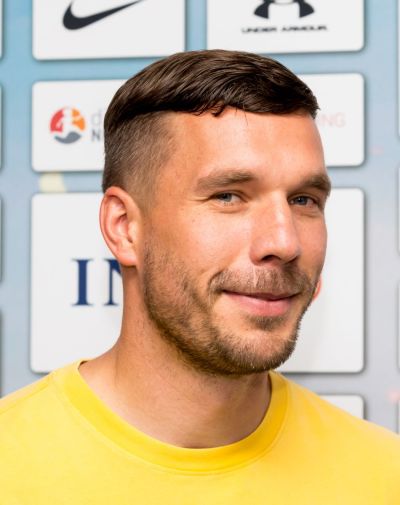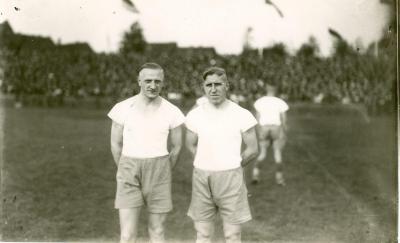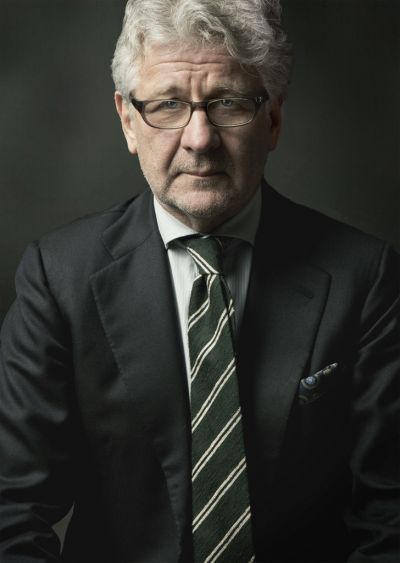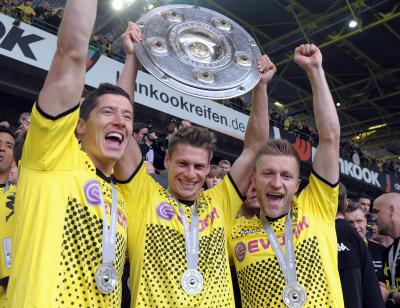Lukas Podolski – the Polish heart of German football

His lovable catchphrase “Shoot goals and go home” (strzelić gola i do domu), which could often be heard, particularly at press conferences, comes directly from the Polish street football scene. His career as a football star in Germany and his media presence in both countries are unique. Is the state-subsidised integration of ‘incomers’ still necessary today? This question is almost a no-brainer when it comes to the overall phenomenon that is “Lukas Podolski”. Football World Champion, darling of the sporting press, crisis manager, entertainer, media star, advertising icon, catchphrase creator and patriotic Rhinelander through and through – these attributes only barely capture the essence of the Cologne-based footballer.
Born Łukasz Józef Podolski in Gliwice in Poland in 1985, he and his family moved to Germany from Upper Silesia in Poland during the late wave of resettlers in 1987. The family initially lived in Bergheim near Cologne. But the 2-year-old Lukas was brought up as Polish and never forgot his ties to Poland. His extended family, which to this day lives in both countries, played an important role on this journey. His parents were involved in competitive sport in Poland. In 1980, his father Waldemar became Polish champion with the Szombierki Bytom club in Bytom, his mother played handball for the Sośnica Gliwice club in Podolski’s neighbourhood in Gliwice. So it is no wonder that, as an adolescent, Lucas soon found his way to competitive sport. He started playing football in Bergheim, but when he was 10 years old, he switched to FC Cologne’s youth team. This is where his legendary rise as a striker began. And this is where he found his sporting home and the springboard to the Bundesliga professional camp. He was soon indispensable to the Cologne club and, in his younger years, was already enjoying the status that came with it; a status that would later become legendary.
Even as a 17-year-old, he was talked about as a national player and had to decide for which of the two countries he should play, Germany or Poland. He would later claim repeatedly that, at the time, the Polish football association had not made him an offer. So, from 2004, “Poldi” was a regular in the German national team; a team with whom, as the highlight of his career, he would become World Champion in 2014. His last goal for Germany in the friendly game against England in 2017 is still unforgettable, and it also marked his farewell from the national team: During the game, he once again demonstrated his phenomenal scoring ability with an unstoppable goal from quite a distance. The way he used the significant force of the slight bend in the short but explosive run-up when he was shooting at goal will definitely go down in football textbooks as the Podolski moment.
No less impressive is his career in professional football. However, whilst his sporting career took him to FC Cologne, Bayern Munich, Arsenal London, Inter Milan and Galatasaray Istanbul, he always stressed that he could well imagine playing in the Polish cult club Górnik Zabrze in the town next to his place of birth. In 2021, his dream was realised.
In the middle of his sporting career, Poldi was acclaimed time and time again as a role model for the way in which he interacted with people from migrant backgrounds, especially in the “melting pot” of Cologne. Always charming, humorous and media savvy, his commitment and engagement were directed primarily at the street football scene amongst the ‘incomers’ and those who were socially vulnerable. This meant that his popularity and approval rating were almost beyond belief and are still legendary to this day. He obviously knew how to make best use of this in the commercial world as well: When he opened an ice cream parlour in Cologne, the management had to issue red cards because of the huge throng of people.
And although the euphoria around him was excessive at times, Poldi always kept his feet on the ground and remained likeable, and ultimately didn’t allow himself to be in the media’s pocket. Not even when the accusations grew that his role in the national team had become that of an affable mascot. His sporting achievements and countless spectacular appearances in the media have meant that Podolski has cleverly been able to prove the opposite and definitively establish his image: as a popular figure with a Polish touch. This is not just down to his cheerful disposition, which is typical of the Rhine region; it is also down to a bit of humorous Polish optimism coupled with a strong sense of the absurd, which often comes across as incorrigible but is always authentic.
A celebrity with such a distinct personality was not only a refreshing novelty in the very often intense German football circles; it was also a very useful characteristic, particularly when faced with sporting challenges and crisis situations. Was this also Podolski’s contribution to the German football team’s victory at the World Cup in 2014?
Lukas Podolski is not just revered, respected and loved in Germany and Poland: His Wikipedia entry is available in 67 languages.
Jacek Barski, November 2022
The official website of Lukas Podolski: https://www.lukas-podolski.com/


